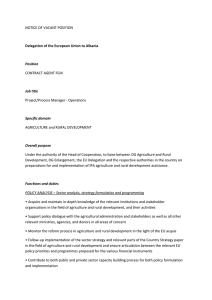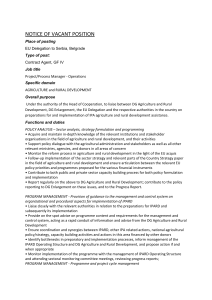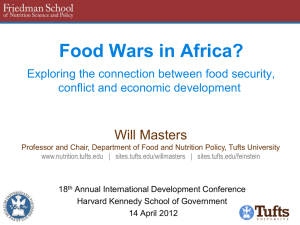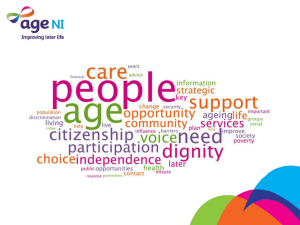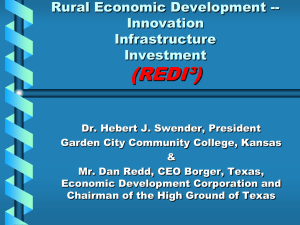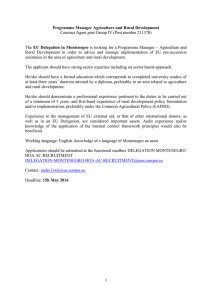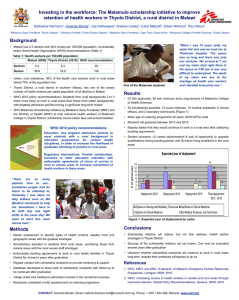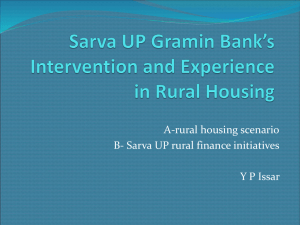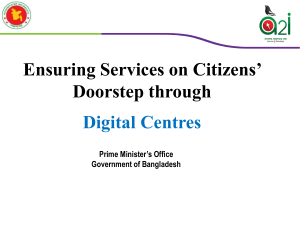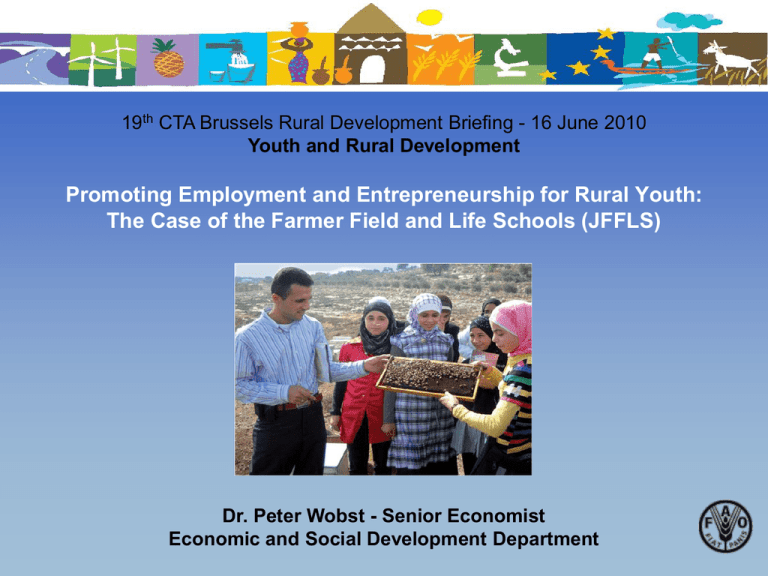
19th CTA Brussels Rural Development Briefing - 16 June 2010
Youth and Rural Development
Promoting Employment and Entrepreneurship for Rural Youth:
The Case of the Farmer Field and Life Schools (JFFLS)
Dr. Peter Wobst - Senior Economist
Economic and Social Development Department
UN System-wide policy coherence
MDG target 1.B (2005): “Achieving full and productive
employment and decent work for all including women
and young people”.
•
•
•
•
System-wide commitment
Second UN Decade for the Eradication of Poverty (2008-2017):
“Full Employment and Decent Work for All”
ECOSOC resolution 2008/18 “Promoting full employment and
decent work for all”
System-wide initiatives
Plan of Action (2nd Poverty Decade)
2009 CEB Crisis Initiatives: Global Jobs Pact and
Social Protection Floor Initiatives
FAO’s New Strategic Framework
FAO Global Goals:
• Reduction of hunger
• Elimination of poverty
• Sustainable management of natural resources
A
B
Crop
production
C
D
E
F
G
H
I
Natural
Markets,
Preparedness
Forest and
Resources
Food
Livestock Fisheries and
Livelihoods,
and Response
Food Safety
Tree
Management &
Security and
production Aquaculture
Rural
to
management Environmental
Nutrition
Development
Emergencies
Challenges
IIEE (2007) recommendation:
“Refocus FAO’s work on value
addition and employment for
income generation and food
access”
K
L
Gender
equity
Investment in
Agriculture
and Rural
Development
Gender, Equity and Rural
Employment Division (ESW)
G
Markets,
Livelihoods,
Rural
Development
Rural Employment Team
Decent rural employment
Strategic Objective G
Enabling environment for markets to improve livelihoods and rural development
Organizational Result 2
Rural employment creation, access to land and income diversification are integrated into
agricultural and rural development policies, programmes and partnerships
Unit Result G0209
The enabling environment in support of decent rural employment is improved
Sub-areas
Principles
Considerations
Topics
Outcomes
Decent work
Decent Work
Agenda
Employ creation
Rights at work
Social Protection
Social Dialogue
Gender
Smallholder trans
Enabling
Environment
Equity
Globalization
Institutions
Climate change
Land / NR
Econ & fin crises
Country-based
strategic approach
Youth
employment
Child labour
prevention
Migration
Others ...
More and better
jobs
Economic & social
empowerment
Increased incomes
and livelihoods
Food security &
poverty reduction
Strategic country support approach
• CEB Gobal Jobs Pact and
Social Protection Floor Initiative
• Second UN Decade for the Eradication
of Poverty (2008-2017)
• CAADP process
• Other regional frameworks
• ILO Decent Work Country
Programmes
• UNDAF
Country support approach
• Country profiles
• Specific policy advice and technical
assistance on rural employment
(e.g. JFFLS via UNJPs)
Share of rural youth in total population
Country data snapshot (Malawi)
Share of youth living with less then 2 US$ per day
66.3%
Typical Malawi youth
Location
Rural
87%
Sex
Female
Age
52%
19
Literate
Yes
63%
Attending school
No
40%
Working youth population
Female 23% (94.6% in agriculture)
National / rural
Male 19% (88.6 % in agriculture)
Many challenges for rural youth
Lack of access to and control over productive
resources (e.g. land and capital)
Inadequate skills (e.g. production, processing
and business skills)
Generational gap (e.g. transfer of indigenous
farming knowledge from adults to young)
Labour market discriminations often result into
higher unemployment rates for young girls
Globalization (e.g. uncertainties, variability in
prices)
Few countries have included employment
promotion strategies in their PRSPs
JFFLS: Creating jobs and engaging people
JUNIOR FARMER FIELD AND LIFE SCHOOLS
Agriculture techniques COMBINED WITH life and business skills
one year cycle
follows
crop cycle
JFFLS graduates
creation of
Youth Farmers’ Associations
JFFLS training modules
Land preparation
Planning in agriculture and in life
Growing up healthy
Agriculture diversity
Protection (IPM and personal protection)
How to face threats and loss
Food processing and conservation
Entrepreneurship – business skills
Water for life
Land and property rights
Child labour prevention (FAO-ILO module)
—————
Monitoring and Evaluation toolkit
Innovative JFFLS curriculum
AGRICULTURAL SKILLS
LIFE-BUSINESS SKILLS
PLANNING IN AGRICULTURE
(planning a cropping calendar)
PLANNING IN LIFE
(importance of setting goals)
WATER MANAGEMENT
(irrigation methods)
WATER IN LIFE – HYGIENE – HEALTH
(quality of water and nutrition)
CHARATERISTICS OF SOIL CONDITION
(methods of sowing and preparation)
PERSONAL CHARATERISTICS
AND DEVELOPMENT
HOW TO PROTECT YOUR CROPS
AND PROPERTY
HOW TO PROTECT YOURSELF
(child labour, rights and property rights)
WHEN TO HARVEST
AND WHAT TO DO WITH IT
(demands from the market)
AGRICULTURE AS A BUSINESS
(business and marketing skills)
ENVIRONMENTAL AWARENESS
(sustainable and diversified agriculture)
MAINTANANCE IN THE PUBLIC
AND PRIVATE PROPERTY
Institutionalization
Ministry of Youth
Ministry of Education
FAO
Institutional Support
Youth Clubs - Schools
Capacity Building
+
Norms and Standards
Vocational Training
Centers
+
Rural
Finance
Institutions
Farmers’
Organizations
&
Cooperatives
Innovation
Programmes
=
Inclusion of agric.
skills in MoYDS - MoE
curriculum
=
Creation of
Youth Farmers’
Associations
National ownership - Up-scaling to all MoYDS clubs and MoE schools & Farmers’ Cooperatives
JFFLS mapping
Implementing countries
Burundi, Cameroon, DRC, West Bank and Gaza Strip, Ghana,
Honduras, Kenya, Malawi, Mozambique, Namibia, Nepal, Rwanda,
Sudan, Swaziland, Tanzania, Uganda, Zambia, Zimbabwe
Foreseen next
Comoros, Haiti and Niger
Youths trained
19,000
Facilitators trained
2,000
UN-wide system coherence: Delivering as ONE
UNDP
UNIFEM
National Government +
UN Country Team (UNCT)
UNDP
UNAIDS
ILO
National
Government
United Nations Development
Assistance Framework
(UNDAF)
=
• National ownership
WHO
UNICEF
• Partnership
• Comparative advantage
FAO
WFP
• Maximum effectiveness
and accountability
UNJPs in Comoros, Nepal, Honduras,
Tunisia, Mozambique, Gaza & West Bank,
Sudan and Malawi
The way forward
Undertake core activities under areas of gender equality and
rural employment, youth employment promotion, child
labour prevention and migration
Seek financial support for developing and applying a
strategic country support approach
JFFLS as integral part of an inclusive FAO country approach
on decent rural employment
Expand country and regional coverage of JFFLS
Enhance institutionalization of JFFLS
Link rural youth employment work to UN country teams and
inter-agency mechanisms:
CEB Joint Crisis Initiatives: Global Jobs Pact and Social Protection
Floor Initiative
UNDAFs, UNJPs, NEPAD/CAADP, DWCPs
Collaboration with ILO
Continued UNJPs cooperation (UN-wide approach)
Link to other development partners and policy areas
Contact: www.fao-ilo.org / peter.wobst@fao.org


